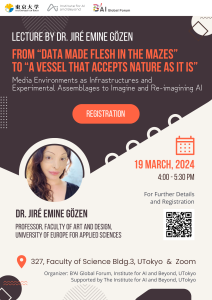2024.Feb.28
EVENTSLecture by Dr. Jiré Emine Gözen
“From “Data Made Flesh in the Mazes” to “A Vessel that Accepts Nature as It Is”: Media Environments as Infrastructures and Experimental Assemblages to Imagine and Re-imagining AI”

The B’AI Global Forum will hold a talk by Dr. Jiré Emine Gözen entitled “From “Data Made Flesh in the Mazes” to “A Vessel that Accepts Nature as It Is”: Media Environments as Infrastructures and Experimental Assemblages to Imagine and Re-imagining AI” on March 19, 2024.
◇Date & Venue
・Date: March 19, 2024 (Tue), 4:00~5:30 pm (JST)
・Venue: On-site (up to 20 participants) & Online Hybrid
・On-site:Room 327, Faculty of Science Bldg.3 (The University of Tokyo, Asano Campus)
・Language: English
・How to register:For on-site participation, please register below by 13 March (Wed); to participate via Zoom please register below by 17 March (Sun).
https://forms.gle/nB2tC2tgYmeL77367
◇Lecturer

Dr. Jiré Emine Gözen(Professor at the Faculty of Art and Design of the University of Europe for Applied Sciences)
Jiré Emine Gözen is a professor of Media and Cultural Theory and teaches at the Faculty of Art and Design of the University of Europe for Applied Sciences in Berlin, she has served as Vice-President of International Affairs and University Development since October 2023. She also has been elected as Chairperson of the Gesellschaft für Medienwissenschaft (German Society for Media Studies) since September 2020.
Her research is situated at the intersection of art and theory, focusing on media cultural studies, media aesthetics, and visual culture. Her work is influenced by critical theory, gender and queer studies, postcolonial theories, and new materialistic perspectives, as well as science and technology studies.
Having spent several years living and working in Japan, including working at institutions such as the Mori Art Museum, 3331 Arts Chiyoda, and Design Festa Gallery, her research now centers on narratives and discourses surrounding human-machine relations and AI, future technologies, and posthumanism. Additionally, she critically examines the visual construction of “subversive” masculinity, with a particular focus on Playboy Magazine. She also explores the phenomenon of mimicry in politics, science, and media, delving into figures like Donald Trump and Elon Musk, as well as alt-right and terrorist movements.
She is an active member of the Forum Antirassismus Medienwissenschaft (Anti-Racism in Media Studies). She has contributed significantly to the field as part of the guest editor team for issue 26 of the Zeitschrift für Medienwissenschaft (Journal for Media Studies), titled “X|Kein Lagebericht” (2022), which examines the intertwining of racism with (media) science and Western epistemologies. Since 2022, she has co-edited GAAAP_ The Blog of the Zeitschrift für Medienwissenschaft (Journal for Media Studies), furthering her commitment to advancing critical discourse within the field.
◇Abstract
The interplay between man, machine, nature, and artificial intelligence, explored through speculative narratives in art and literature, significantly shapes societal perceptions and discussions that feed into our shared “sociotechnical imaginaries.” This presentation delves into differing media environments in art and literature as experimental infrastructures and assemblages through which imaginations and re-imaginations of AI unfold. Focusing on William Gibson’s notion of the “Matrix” (1984) alongside Rei Naito’s artwork “母型” (“Matrix”, 2010) situated within the Teshima Art Museum, this presentation discerns contrasting visions of AI and posthumanist futures. While Gibson’s vision evokes echoes of dominant narratives, Naito’s interpretation offers a divergent path, one that intertwines with New Materialist perspectives and paths the way towards indigenous epistemologies.
◇Organizer
B’AI Global Forum, Institute for AI and Beyond, The University of Tokyo
◇Supported by
The Institute for AI and Beyond, The University of Tokyo
◇Inquiry
B’AI Global Forum Office
bai.global.forum[at]gmail.com(Please change [at] to @)